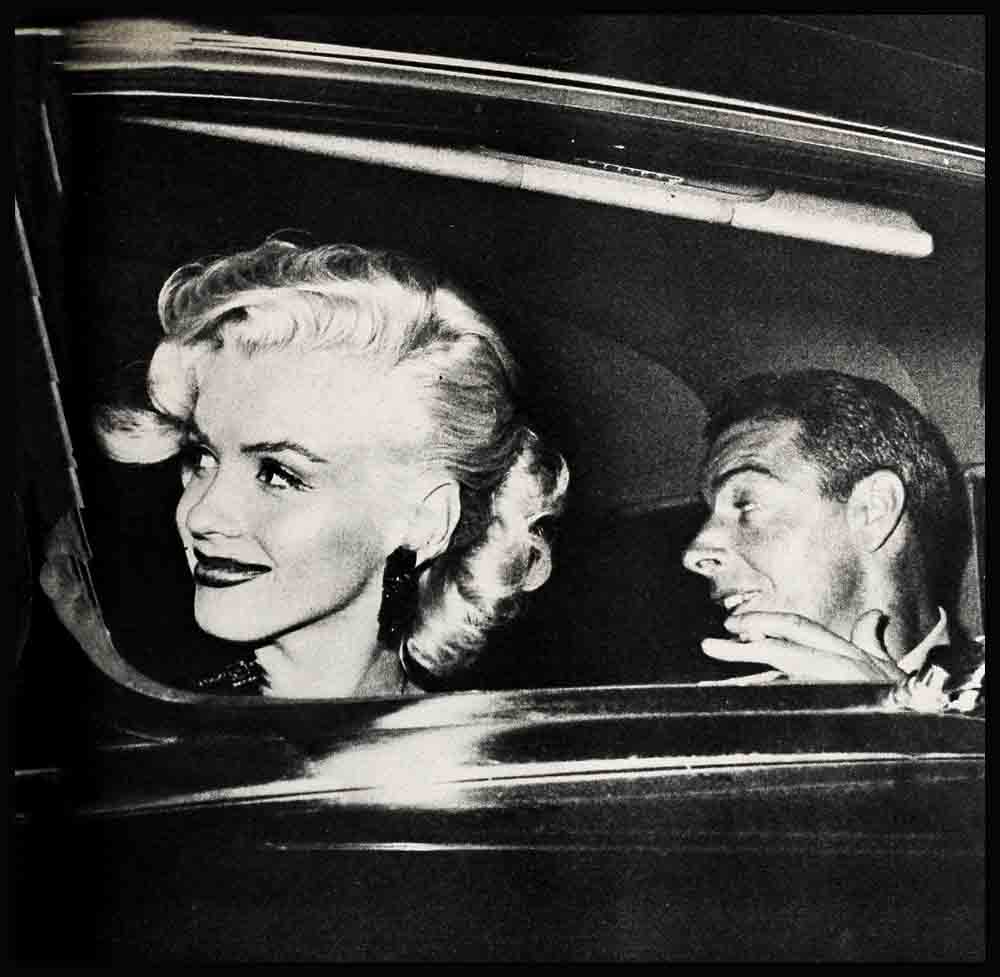
Journey Into Paradise—Marilyn and Joe
A blind date was the last thing in the world that she wanted that evening.
She would not, she informed the mutual friend who was suggesting it, get all dressed up again to go to the Villanova with an unknown character named Joe.
“I don’t care how important he is,” she stated emphatically. “I worked hard today and I’m ‘tired. He could offer to buy me nightingales’ tongues on toast and I’d still rather eat the leftover meat loaf that’s in the refrigerator.”
Getting really wound up, she added, “Besides, he probably has the latest in form-fitting suits, slick black hair and a line to match.”
But the friend continued to plead, and because she valued his friendship, she consented at last. She made one final provision, though. “Don’t pick me up,” she directed. “I’ll drive my own car. That way I can leave when I choose and get home without hearing any large talk about the beauties of a drive through the lovely evening.”
Yet a few hours later, she was driving through that lovely evening, many miles out of her own way, taking the young man home, and wishing there were even more miles to drive.
For this blind date had been different. The slick black hair she had anticipated turned out to be a crisp crew cut. And he had no line at all, no jokes. Throughout dinner, he had been shy and reserved, talking very little. He had even neglected the excellent meal before him. He scarcely ate at all. Instead he just looked at her.
But when at last she stopped the car at his door, he had found nerve enough to say the one important thing, “Can I see you tomorrow night?”
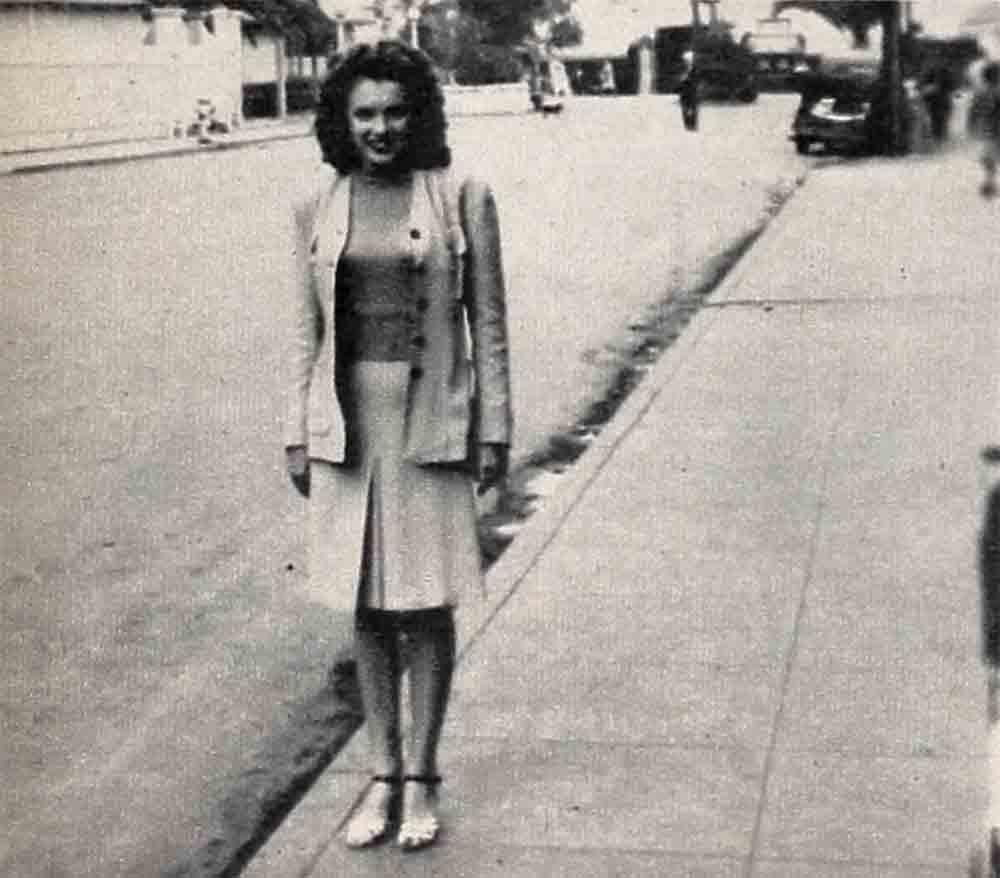
Thus, in a manner duplicating the boy-girl story of a million young couples, did one of Hollywood’s most publicized romances begin. For the girl was Marilyn Monroe, the blonde lovely whose name has become synonymous with all that’s alluringly feminine. And the man was Joe DiMaggio, affectionately called by his followers “The Yankee Clipper,” who in his days as a big-league ballplayer regularily reaped roars of approval for his skill in winning games.
In theory, they should have known all about each other, for the basic facts of both their lives had long been public property.
Anyone who chose to read it could easily learn the full story of Marilyn Monroe’s desolate childhood. Her father had simply disappeared. Her mother, too ill to care for her, had placed her in an orphanage, and from that she went to a series of foster homes. She had lived in countless homes before she was fifteen years old. At sixteen, she had married a young man in the Merchant Marine.
The proposing in that youthful marriage, had been done, strangely enough, neither by the bride nor the bridegroom, but by one of her guardians who wanted to make sure that Marilyn had someone to care for her when the foster family moved away from California.

But the marriage was destined not to last. For Marilyn, ambition then became a driving force. Modelling jobs brought both quick cash and a screen test. The first studio to put her under contract dropped her. But it did give her the chance to learn, in the talent training program, how to become an actress.
In contrast to Marilyn’s lonely climb toward stardom, Joe DiMaggio had always been surrounded by a warm family.
The eighth of nine children, he had grown up in San Francisco. His elder brother, Vince, led the way into big league baseball. He played briefly for the New York Giants and longer for the Pittsburgh Pirates. The third DiMaggio, Dominick, went to the Boston Red Sox.
Almost from the first time he went to bat for the Yankees, Joe had been a star. At the time of his retirement, shortly before he met Marilyn, he had seen his name turn up on all-time All-American lists.
But in his love life, he had struck out. When seeking a divorce in 1944, his wife, former actress Dorothy Arnold, had charged that Joe had never taken kindly to domestic routine. In her words, “He never acted like a married man.”
With such information widely published, Joe and Marilyn could have known every- thing about each other. Yet actually, they discovered, during that first meeting, that they knew nothing.
In fact, Joe and Marilyn needed most of all that one thing which almost every newly-entranced couple can take for granted—the right to some time alone in order to get acquainted with each other.
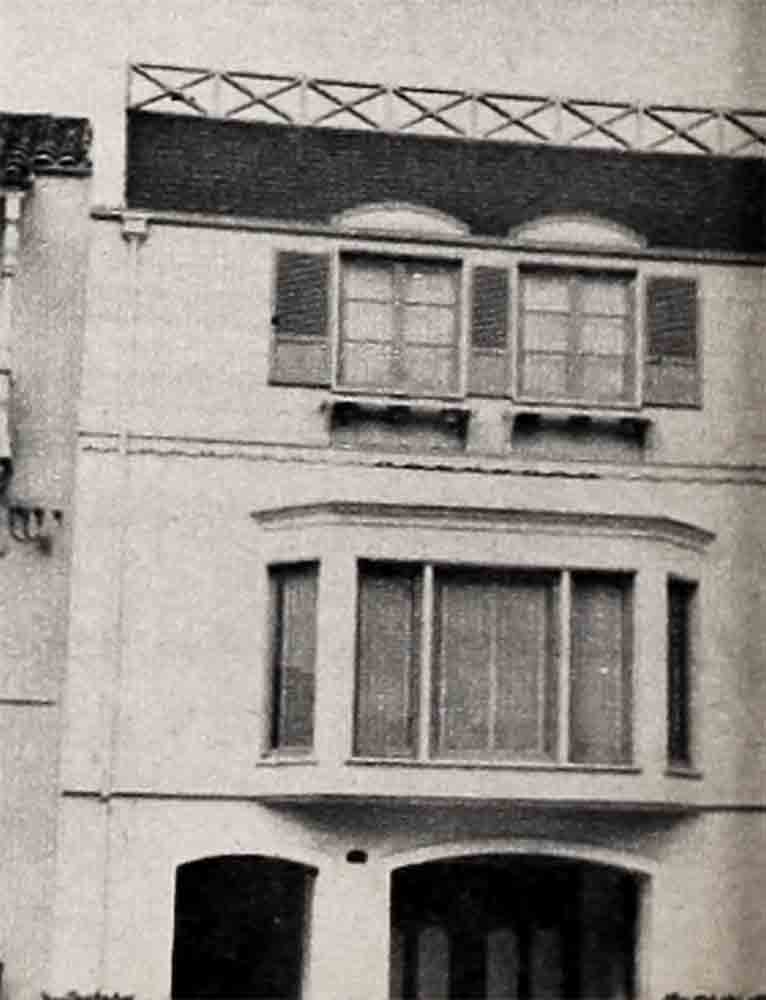
But when you’re a movie star or a baseball hero, such time becomes the most precious of luxuries. After their first meeting, they had just two weeks from which to salvage a few hours of their own, for Joe was due to report in New York to start his new work as a baseball commentator and Marilyn was in the midst of making a picture.
Despite such pressures, they managed to dine together every evening. They avoided the big showy places and went, instead, to those little, out-of-the-way restaurants where there was candle light, soft music and a chance for quiet talk.
But even in such restaurants, two such well-known people as Marilyn Monroe and Joe DiMaggio could not fail to attract attention. When the press tracked them down and demanded to know what they talked about, Marilyn confessed they had discussed baseball. “Joe explained it to me,” she stated.
Joe, for his part, said nothing. Always publicity-wary, he now refused to discuss Marilyn with even his closest friends. He went East and the report of their long-distance phone conversation after his first telecast came from Marilyn. “He was nervous about it,” she admitted. “He’s really a shy guy. That’s why I have to be so careful what I say about him.”
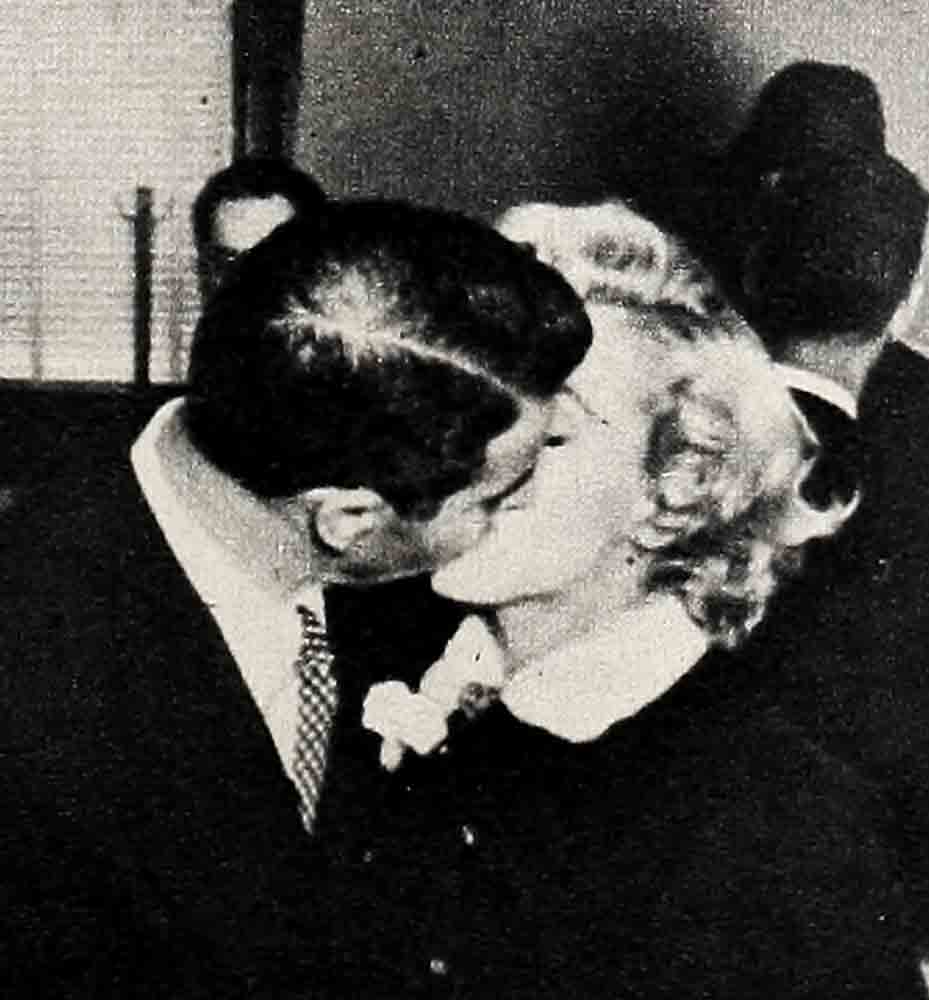
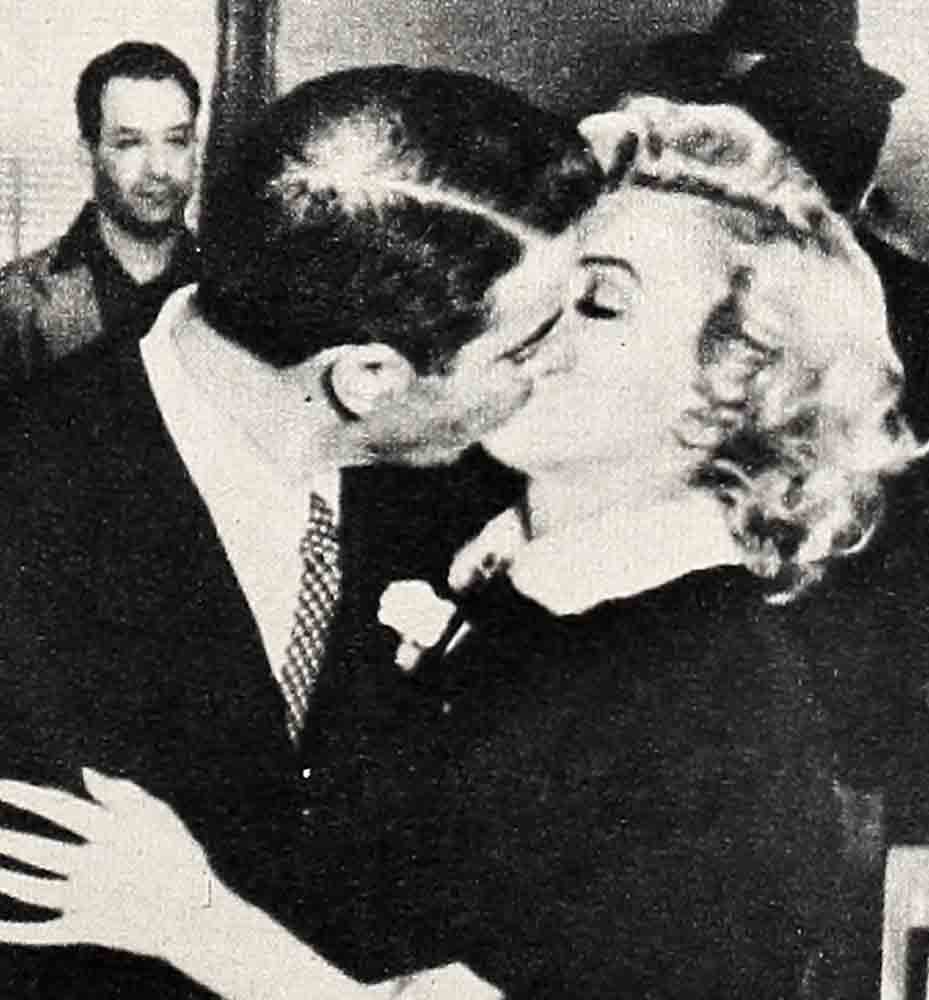
She continued to be careful what she said about him during the two years they went together, but her statements about herself during that period were pithy and oft-quoted.
For Marilyn Monroe had discovered that the right answers could be as provocative as her curves.
It was during that period that, when asked what she had on when the famous calendar shot was made, she replied, “The radio.” It was then, that during an interview with Photoplay columnist Mike Connolly, the word “nude” ran through the entire conversation. It was her description for the way she liked to feel, for the color of her favorite shoes, stockings and down-filled satin comforter.
Her public actions matched this theme song. When she turned up at important events such as Photoplay’s Gold Medal Awards dinner, she was attired in a gown and manner so sexy that some of the older actresses, fed up with it, said, “Why Reaaaaly!” in Mrs. Astorbilt tones and much-quoted detail.
That was her spotlighted life. But her private life, particularly when Joe was in Hollywood, contrasted sharply.
Snubbing Hollywood wolves had long been a habit with Marilyn. As she rose toward fame, she lived quietly and alone, preferring night school to night clubs, an interesting book to a glamour date.
Now her shunning of show places grew even more marked; and despite being a guy whose former wife had complained that he was undomesticated, Joe was showing a decided preference for the quiet evening at home.
Their ideal date started with dinner at Marilyn’s apartment. While making no claims as a cook, she did contend, during this period, that she could broil a steak and make a good salad and that suited Joe just fine. After dinner, they would sit around watching television—or just talk.
For there was much to talk about. Serious things like marriage.

To close friends, both admitted they were serious about marriage. From that first blind date together, neither had gone out with anyone else. They admitted they were in love, but they wanted to be sure. Sure it would last. Sure they could work out a personal solution to the classic career-vs-marriage conflict. Sure they had a reasonable chance to be happy together.
The press, less patient, again and again reported prematurely that they were already secretly married.
When such rumors made the rounds, Marilyn and Joe usually ignored them. Once, however, growing impatient, Marilyn brushed off a questioner by saying, “I wouldn’t want to keep my marriage a secret. There would be no reason to do so.”
Firmly, they held to the policy of trying to keep their private life private. They carried it so far that, to avoid talk, Marilyn would appear all alone at parties or openings where she was likely to be photographed. Joe, if he was in town, turned up only after the Kliegs were turned off, and he would take her home.
Romance, however, is inherently, unquiet. In the course of nearly every young couple’s association, there comes a time when, it seems, they must prove for themselves the truth of that ancient adage, “The course of true love never runs smooth.”
For Joe and Marilyn, that time came with the Christmas holidays.
Despite her claims that she is Hollywood’s most self-sufficient career girl, Marilyn is sentimental. Christmas was no time to be alone. Christmas was a time to be with the man she loved.
Christmas, even though her most important picture, to date, was due before the cameras, was a time to spend with Joe at the big old DiMaggio house in San Francisco.
It wouldn’t be surprising if, in her thoughts, the DiMaggio house had become almost as important as Joe himself, for it is virtually a symbol of the kind of family life Marilyn had always missed. Owned originally by Joe’s grandparents and now the joint property of several of the younger DiMaggios, it’s big enough to shelter all of the clan who want to come home for the holidays—and Joe’s girl, too.
On the street floor, there’s a guest room, bath, laundry room, furnace room and garage. On the second floor, there’s a seven-room apartment; on the third floor, there’s another big parlor, a service pantry, four bedrooms and three baths. Out on the roof, at the rear, are Joe’s own diggings—a living room, bedroom and bath.
What happened in that house at Christmas is locked in the private recollections of the family and Joe and Marilyn.
The part the public saw was Joe and Marilyn appearing happy and relaxed at the DiMaggio restaurant down on Fisherman’s wharf, at other famed cafes and at parties given by friends. They were packing as much enjoyment as possible into a few days, for Marilyn was due back in Hollywood to start work on her picture.
But when the time came, no one could find Marilyn. For the first time in her usually cooperative career, Marilyn had left the studio in the lurch. Marilyn let it be known through her agent, that she didn’t like her salary and she hadn’t seen the script, and she didn’t like that. “I’ve never felt so harassed in my life,” she told her agent. “But there’s no foundation to those marriage rumors.”
And after that, there was silence. The studio suspended her and the ladies and gentlemen of the press started a search to find Marilyn.
During one frantic twenty-four hour period, she was reported to be: 1) at the home of friends; 2) In New Orleans with Actor Rock Hudson; 3) en route to Las Vegas to marry Joe DiMaggio.
The romance, which Joe and Marilyn had kept so preciously personal for so long, was all over the nation’s front pages.
In such commotion, many a romance has smashed to splinters; but the understanding and faith which had developed during the quiet hours Marilyn and Joe had spent together carried them through. Later, it was learned that they had compromised on the one cause for disagreement. Joe had insisted on a quiet wedding—no publicity whatsoever. Marilyn had said she was honor-bound to let Twentieth know. They agreed, finally, that she was to call her studio—one hour before the ceremony.
But that hour stretched to two and both were filled with confusion. Word that they were to be married at the city hall spread throughout San Francisco. There was a small riot going on in the corridors by the time Joe and Marilyn arrived.
A clerk from the Marriage License Bureau couldn’t get through until Judge Peery sent out word to police to clear a path for him, so that he could bring the license into the judge’s chambers. Joe grinned as he ploughed through, saying, “O.K., let’s get this marriage going.”
Marilyn wore a chocolate brown suit with an ermine collar and carried a small bouquet of three white orchids. Joe wore a blue suit—and much of his bride’s lipstick. When, as they kissed after the ceremony, photographers and newsreel men called for their usual, “Just one more, please,” Joe agreed with enthusiasm.
In a tactical maneuver which would do credit to the general of an army, they slipped away from friends, fans and newsmen. Later, it was reported they had stayed, for the first night of their honeymoon, in a roadside motel where the cost of their room was exactly four dollars.
Marilyn and Joe had escaped from the commotion and already were leading the quiet life both preferred—a life in which their love is the focus.
THE END
It is a quote. PHOTOPLAY MAGAZINE APRIL 1954




